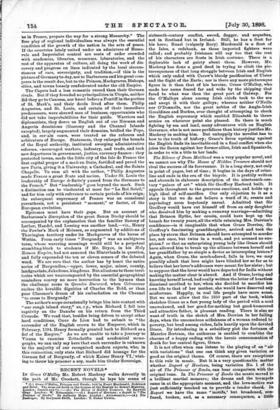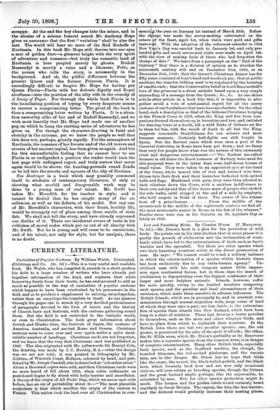RECENT NOVELS.* IN Grace O'Malley Mr. Robert Machray walks devoutly
in the path of Mr. Crockett, though he lays his scene of
• n.) Grace O'Malley, Princess and Pirate: told by Euari Macdonald, Bedshank and Rebel. The same set forth n the tongue of the English by Robert Maahray. London : Cassell and Co.—(2.) The Houu of Hidden Treasure. By Maxwell Gray. London: W. Heinemann.—(3.) Rupert of Hentsau: a Sequel to "The . Prisoner of Zenda." By Anthony Hope. London : Arrowsmith.--(4.) The Destroyer. By Benjamin Swift. London : T. Fisher Unwin.
sixteenth-century conflict, sword, dagger, and arquebus, not in Scotland but in Ireland. Still, he has a Scot for his hero; Ruari (vulgarly Rory) Macdonald is a Scot of the Isles, a redshank, as these imported fighters were called ; and probably Irishmen will say too that the rest of his characters are Scots in Irish costume. There is a. deplorable lack of gaiety about them. However, Mr. Machray has done a good deed in trying to elicit the pic- turesqueness of that long straggle between Irish and English which only ended with Carew's bloody pacification of Ulster and the flight of the Earls ; nor is there any more picturesque figure in it than that of his heroine, Grace O'Malley, who made her name feared far and wide by the shipping that fared to what was then the great port of Galway. For the °Walleye alone among Irish chiefs took to the sea and swept it with their galleys; whereas neither O'Neills nor O'Donnells, nor the great nobles of the Anglo-Irish Geraldines and Burkes, ever thought of attempting to check the English supremacy which enabled Elizabeth to throw armies on whatever point she pleased. So there is much fighting by sea and land, many adventures with an English Governor, who is not more perfidious than history justifies Mr. Machray in making him. But unhappily the novelist has to bow to the truth of history ; Grace's fierce uprising against the English finds its inevitable end in a final conflict when she joins the Saxon against her former allies, Irish and Spaniards. in order to win a title to her lands.
The Silence of Dean Maitland was a very popular novel, and we cannot see why The House of Hidden Treasure should not rival the success of its forerunner. It is a long story, not only in point of pages, but of time ; it begins in the days of crino- line and ends in the era of the bicycle. It is prettily written and abounds in elaborate description of the nineteenth-cen- tury "palace of art" which Sir Geoffrey Harbord built. It appeals throughout to the generous emotions, and holds up a high ideal of self-sacrifice. Our only objection to it as a story is that we do not believe a word of it; events and psychology seem hopelessly unreaL Admitted that Sir Geoffrey would have cut himself off from an only daughter who deceived him by making a runaway marriage—admitting that Brinson Hythe, her cousin, could have kept up the breach for twenty years, all the while retaining Mrs. Dorrien's confidence—is it imaginable that when Grace Dorrien, Sir Geoffrey's fascinating granddaughter, arrived and took the place by storm that Brinson should have attempted to murder her, not once, but twice in a week, and yet aroused no sus- picion? or that an enterprising young lady like Grace should have allowed him to break up the alliance between herself and her grandfather by so simple a device as intercepting letters P Again, when Grace, the much-adored, falls in love, we may possibly admit that love might have blinded her so far as to believe that her lover's addresses were meant for her sister ; but to suppose that the lover would have departed for India without making the matter clear is absurd. And if Grace, loving end knowing herself loved, had really written the letter of heartletis dismissal ascribed to her, when she decided to sacrifice het own life to that of her mother, she would have deserved any misfortune. Happily, in real life people have more sense. But we must allow that the 1850 part of the book, which sketches Grace as a fast young lady of the period with a soul nnawakened, and her good-for-nothing but good-humoured and attractive father, is pleasant reading. There is also no want of truth in the sketch of Mrs. Dorrien in her failing days, when the unconscious selfishness of a woman reduced to poverty, but bred among riches, falls heavily upon the devoted Grace. By introducing in a subsidiary plot the fortunes of Maurice Bertram, the authoress is enabled to combine the charms of a happy ending with the heroic consummation of death for her central figure, Grace.
It is not often when one listens to the playing of an "air with variations " that one can think any given variation as good as the original theme. Of course, there are exceptions to this rule in music. But it is a very questionable matter whether Rupert of Hentzau, being variation No. 1 of the air of The Prisoner of Zenda, can bear comparison with the original tune. In The Prisoner of Zenda the music moved to a brilliant martial measure; the drums and the trumpets came in at the appropriate moment, and the love-motive was just sufficiently touched on to provide a tender chord. In Rupert we have the same "motifs," but broadened, con- fused, broken, and, as a necessary consequence, a little scrappy. At the end the key changes into the minor, and in the strains of a solemn funeral march Mr. Anthony Hope gives us assurance that the first "variation" shall be also the last. The world will hear no more of the Red Rudolfs of Ruritania. In this book Mr. Hope still throws into our eyes a sort of golden dust—a glamour bright with the very spirit of adventure and romance—but truly the romantic land of Ruritania is here peopled merely by ghosts. Rudolf Rassendyl is merely a voice and a likeness; Fritz, as the person who tells the story, is necessarily in the background. And oh, the pitiful difference between the present Queen and the former Princess Flavia. It is exceedingly difficult to forgive Mr. Hope for having put Queen Flavia—Flavia with her delicate dignity and Royal aloofness—into the position of the silly wife in the comedy of A Scrap of Paper. For through the whole book Flavia is in the humiliating position of trying by every desperate means to recover a compromising letter. The pivot of the book is thus a compromising letter written by Flavia. It is a situa- tion unworthy alike of her and of Rudolf Rassendyl, and we wish most heartily that Mr. Hope had made use of another peg on which to hang the exciting series of adventures he has given us. For though the character-drawing is faint and sketchy in the extreme, yet we know the people so well that this does not, perhaps, greatly signify. For the atmosphere of Ruritania, the romance of her forests and of the old towers and streets of her ancient capital, has been given us again. And but for this uncomfortable feeling that he cannot bear to see Flavia in so undignified a position the reader would turn the last page with unfeigned regret, and truly sorrow that never again would he be shown the hunting-grounds round Zenda or be led into the streets and squares of the city of Strelsan.
Tae Destroyer is a book which may possibly commend itself to students of contemporary literature, if only as showing what morbid and disagreeable work may be done by a young man of real talent. Mr. Swift has taken Mr. Meredith for his teacher in style, and it cannot be denied that he has caught many of the ex- cellences, as well as the defects, of his model. But any one of Mr. Meredith's characters, with their frank, healthy life, would be strangely out of place among these smells of stale -fish. We shall not tell the story, and have already expressed our dislike of it. There are incidental errors of taste in his criticism of moral codes which put us out of all charity with Mr. Swift. Bat he is young and will cease to be omniscient, and of his talent, not only for style, but for analysis, there is no doubt.



































 Previous page
Previous page